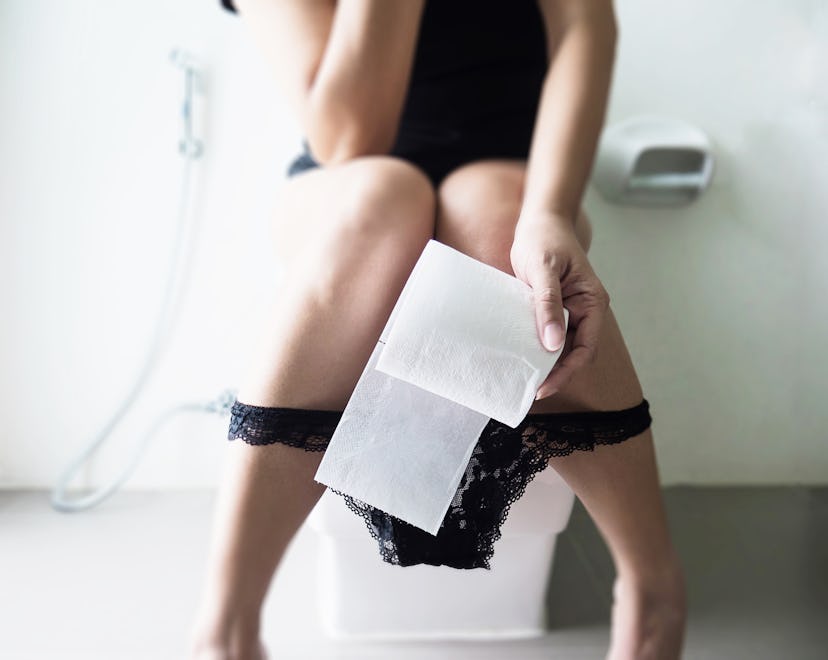Symptoms

Straining While Pooping During Pregnancy Can Cause This One Sucky Thing
Will it affect your baby at all?
For plenty of people, pregnancy and digestive issues seem to go hand-in-hand, sometimes to a concerning degree. So to put it bluntly, will straining when you poop hurt the baby? It’s a real question for many people who are expecting a baby and experiencing serious gastro issues.
Will straining during pregnancy hurt the baby?
For most pregnancies that are progressing without any issues, it isn’t a huge concern. “Straining won’t harm the baby, but it can lead to hemorrhoids and anal fissures which can be very painful and uncomfortable for mom,” Dr. Zachary Hamilton, board certified OB/GYN at Austin Regional Clinic in Austin, Texas, tells Romper in an email. Although not a serious health risk, hemorrhoids can be quite painful. There are ways to help avoid hemorrhoids during pregnancy, however, such as getting enough fiber and staying hydrated. If you do get them, hemorrhoids are generally not difficult to treat, and even a simple sitz bath can help improve them considerably, according to a study in Women and Birth: Journal of the Australian College of Midwives.
There are some other potential health issues associated with difficult trips to the bathroom, however. For instance, “straining a lot or for long duration actually can reduce blood flow to the pregnant person's heart and head and cause dizziness,” Dr. Rebecca Levy-Gantt, Premier ObGyn Napa Inc., author of Womb With A View: Tales from the Delivery, Emergency and Operating Rooms , tells Romper. Pregnant people who experience low blood pressure, or a history of heart problems, may want to be especially aware of this possibility, as Dr. Levy-Gantt further explains.
And even if you are experiencing difficulty going to the bathroom, remember that your baby is in a whole other part of the body. “The rectum sits beneath the vagina and would not transmit too much pressure to the placenta,” Dr. Kim Langdon, MD, an OB/GYN, tells Romper. “Furthermore, the intrauterine contents are a closed system and do not experience the intra-abdominal pressure changes associated with bearing down or straining.” Even if you’re having a *bad* time, the baby probably won’t even know.
Those with certain health conditions, however, may want to know more about whether straining could be potentially harmful. “There are certain pregnancy complications that make straining more dangerous. Those include placenta previa (when the placenta low and is over the cervix) because it could cause bleeding, preterm labor, or problems with the cervix such as women who have a cerclage,” Dr. Kelly Culwell, board certified OB/GYN tells Romper. If you are experiencing these or any other complications during pregnancy, then talk about whether straining may potentially be problematic with your physician.
Why does pregnancy cause gastro problems, anyway?
“Bowel problems like constipation are common because the hormones of pregnancy (especially Progesterone, which relaxes the smooth muscles in the body) often slow down metabolism, and that causes the intestines also to be more sluggish,” says Dr. Levy-Gantt. “That can cause gas to build up, and cause constipation.” You’re hardly the first pregnant person to deal with stomach issues, if that’s any consolation.
What can you do to help ease the stomach issues caused by pregnancy?
Thankfully, the doctors have some advice about easing your stomach issues while expecting. “Move around! Staying active can help keep your bowels active. Eat a balanced diet that includes fiber. Stay well hydrated and if you’re still having trouble with bowel movements, talk to your doctor,” says Dr. Hamilton. “A stool softener might help move everything along as well and is generally considered safe in pregnancy.” In other words, don’t hesitate to talk to your doctor about issues with straining while you poop during pregnancy, because it’s often a common and manageable issue.
Studies referenced:
Shirah B.H., Shirah H.A., Fallata A.H., Alobidy S.N., Hawsawi M.M.A. (2017). Hemorrhoids during pregnancy: Sitz bath vs. ano-rectal cream: A comparative prospective study of two conservative treatment protocols. Women Birth, https://pubmed.ncbi.nlm.nih.gov/29055673/
Experts:
Dr. Kelly Culwell (AKA Dr. Lady Doctor), OB-GYN
Dr. Zachary Hamilton, board certified OB-GYN, Austin Regional Clinic in Austin, Texas
Dr. Kim Langdon, MD, OB-GYN
Dr. Rebecca Levy-Gantt, Premier ObGyn Napa Inc., author of Womb With A View: Tales from the Delivery, Emergency and Operating Rooms
This article was originally published on